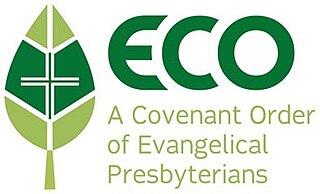
Presbyterianism is a part of the Reformed tradition within Protestantism that broke from the Roman Catholic Church. Presbyterian churches derive their name from the presbyterian form of church government by representative assemblies of elders. Many Reformed churches are organised this way, but the word Presbyterian, when capitalized, is often applied to churches that trace their roots to the Church of Scotland or to English Dissenter groups that formed during the English Civil War.

The Presbyterian Church (USA), abbreviated PC (USA), is a mainline Protestant denomination in the United States. It is the largest Presbyterian denomination in the country, known for its liberal stance on doctrine and its ordaining of women and members of the LGBT community as elders and ministers. The Presbyterian Church (USA) was established with the 1983 merger of the Presbyterian Church in the United States, whose churches were located in the Southern and border states, with the United Presbyterian Church in the United States of America, whose congregations could be found in every state.
Presbyterianpolity is a method of church governance typified by the rule of assemblies of presbyters, or elders. Each local church is governed by a body of elected elders usually called the session or consistory, though other terms, such as church board, may apply. Groups of local churches are governed by a higher assembly of elders known as the presbytery or classis; presbyteries can be grouped into a synod, and presbyteries and synods nationwide often join together in a general assembly. Responsibility for conduct of church services is reserved to an ordained minister or pastor known as a teaching elder, or a minister of the word and sacrament.

The Church of Scotland is the national church in Scotland.

The Presbyterian Church in America (PCA) is the second-largest Presbyterian church body, behind the Presbyterian Church (USA), and the largest conservative Calvinist denomination in the United States. The PCA is Reformed in theology and presbyterian in government.

The Presbyterian Church in the United States of America (PCUSA) was a Presbyterian denomination existing from 1789 to 1958. In that year, the PCUSA merged with the United Presbyterian Church of North America. The new church was named the United Presbyterian Church in the United States of America. It was a predecessor to the contemporary Presbyterian Church (USA).

The Book of Confessions contains the creeds and confessions of the Presbyterian Church (U.S.A.). The contents are the Nicene Creed, the Apostles' Creed, the Scots Confession, the Heidelberg Catechism, the Second Helvetic Confession, the Westminster Confession of Faith, the Shorter Catechism, the Larger Catechism, the Theological Declaration of Barmen, the Confession of 1967, the Confession of Belhar, and the Brief Statement of Faith.
The Book of Common Order, originally titled The Forme of Prayers, is a liturgical book by John Knox written for use in the Reformed denomination. The text was composed in Geneva in 1556 and was adopted by the Church of Scotland in 1562. In 1567, Séon Carsuel translated the book into Scottish Gaelic under the title Foirm na n-Urrnuidheadh. His translation became the first Gaelic text to be printed in Scotland. In 1996 the Church of Scotland produced "Leabhar Sheirbheisean", a Gaelic supplement to the Book of Common Order.

The Directory for Public Worship is a liturgical manual produced by the Westminster Assembly in 1644 to replace the Book of Common Prayer. Approved by the Parliament of England in 1644 and the Parliament of Scotland in 1645, the Directory is part of the Westminster Standards, together with the Westminster Confession of Faith, the Westminster Shorter Catechism, the Westminster Larger Catechism, and the Form of Church Government.
There have been several liturgical books used in the Presbyterian Church (USA). Presently, the primary liturgical book of the Presbyterian Church (USA) is The Book of Common Worship of 1993, published in cooperation with the Cumberland Presbyterian Church.
The English Language Liturgical Consultation (ELLC) is a group of national associations of ecumenical liturgists in the English-speaking world. Their work has been concerned with developing and promoting common liturgical texts in English and sharing a common lectionary wherever possible. It is the successor body to the International Consultation on English Texts (ICET).
Attitudes in Presbyterianism toward homosexuality vary, ranging from outright condemnation to complete acceptance.
Presbyterian worship documents worship practices in Presbyterian churches; in this case, the practices of the many churches descended from the Scottish Presbyterian church at the time of the Reformation.
Superintendent is the title given to a person who is a leader of a Christian denomination at the regional or national level in some Protestant denominations.

The Presbyterian Church of Brazil is an Evangelical Protestant Christian denomination in Brazil. It is the largest Presbyterian denomination in the country, having an estimate 702,949 members, 4,915 ordained ministers and 5,420 churches and parishes. It is also the only Presbyterian denomination in Brazil present in all 26 States and the Federal District.

Under Charles I, the Puritans became a political force as well as a religious tendency in the country. Opponents of the royal prerogative became allies of Puritan reformers, who saw the Church of England moving in a direction opposite to what they wanted, and objected to increased Catholic influence both at Court and within the Church.
Presbyterian Association of Musicians (PAM) is a national organization of the Presbyterian Church (USA) for people who are involved in the areas of Reformed Christian worship, Church music, and liturgical arts. The national offices for this 1,600 member organization are located in Louisville at the National Office of the Presbyterian Church (USA). "Members of the Presbyterian Association of Musicians (PAM) include choir directors, organists, ministers, and other persons interested in the quality and integrity of music in the worship experience."

ECO: A Covenant Order of Evangelical Presbyterians is an evangelical Presbyterian denomination in the United States. As a Presbyterian church, ECO adheres to Reformed theology and Presbyterian polity. It was established in 2012 by former congregations and members of the Presbyterian Church (USA), abbreviated PC(USA). Denominational disputes over theology—particularly ordination of practicing homosexuals as pastors and gay marriage—and bureaucracy led to the founding of ECO. In 2018, ECO has over 383 congregations, 103,425 covenant partners and over 500 pastors. ECO churches are egalitarian in beliefs and ordain women as pastors and elders.

Presbyterianism has had a presence in the United States since colonial times and has exerted an important influence over broader American religion and culture.
Protestant liturgy or Evangelical liturgy is a pattern for worship used by a Protestant congregation or denomination on a regular basis. The term liturgy comes from Greek and means "public work". Liturgy is especially important in the Historical Protestant churches, both mainline and evangelical, while Baptist, Pentecostal, and nondenominational churches tend to be very flexible and in some cases have no liturgy at all. It often but not exclusively occurs on Sunday.










